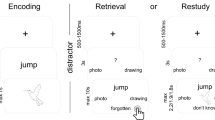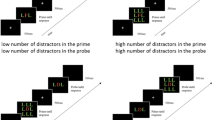Summary
Three experiments are reported, that examine the basis of the recall superiority of subject-performed tasks (SPTs) over verbal-memory tasks (VTs), and the interitem variability for SPTs. In Experiments 1 and 2 a component analysis of SPTs is undertaken in order to explore the importance of (a) involvement of external objects, (b) multimodality, and (c) enactment, for the superior memory performance for SPTs over that for VTs. In Experiment 3 the role of retrieval support, in terms of a high degree of match between the encoding and retrieval situations, was investigated in order to find out why some SPTs are easier to recall than others. The results indicate that it is difficult to separate out a single component as the most critical one for the superiority of SPT recall over VT recall, and that a high degree of match between encoding and retrieval conditions improves SPT recall. It is suggested that, in order to explain the large differences in memorability between SPTs and VTs, it is sufficient to consider the more supportive encoding situation for SPTs, but to explain differences in recallability between various SPTs, the compatibility between encoding and test has to be taken into consideration.
Similar content being viewed by others
References
Bäckman, L. (1985). Further evidence for the lack of adult age differences on free recall of subject-performed tasks: The importance of motor action.Human Learning, 4, 79–87.
Bäckman, L., Mäntylä, T., & Herlitz, A. (1991). The optimization of episodic remembering in old age. In P. B. Baltes & M. M. Baltes (Eds.),Successful aging: Perspectives from the behavioral sciences (pp. 118–163). New York: Cambridge University Press.
Bäckman, L., & Nilsson, L.-G. (1984). Aging effects in free recall: An exception to the rule.Human Learning, 3, 53–69.
Bäckman, L., & Nilsson, L.-G. (1985). Prerequisites for lack of age differences in memory performance.Experimental Aging Research 11, 67–83.
Bäckman, L., Nilsson L.-G., & Chalom, D. (1986). Further evidence on the nature of the encoding of action events.Memory & Cognition, 14, 339–346.
Cohen, G., & Faulkner, D. (1989). The effects of aging on perceived and generated memories. In L. W. Poon, D. C. Rubin, & B. A. Wilson (Eds.),Everyday cognition in adulthood and old age (pp. 222–243). New York: Cambridge University Press.
Cohen, R. L. (1981). On the generality of some memory laws.Scandinavian Journal of Psychology, 22, 267–281.
Cohen, R. L. (1983). The effect of encoding variables on the free recall of words and action events.Memory & Cognition, 11, 573–582.
Cohen, R. L. (1984). Individual differences in event memory: A case for nonstrategic factors.Memory & Cognition, 12, 633–641.
Cohen, R. L. (1988). Metamemory for words and enacted instructions: Predicting which items will be recalled.Memory & Cognition, 16, 452–460.
Cohen, R. L. (1989). Memory for action events: The power of enactment.Educational Psychology Review 1, 57–80.
Cohen, R. L. & Bean, G. (1983). Memory in educable mentally retarded adults: Deficit in subject or experimenter?Intelligence, 7, 287–298.
Cohen, R. L., Peterson, M., & Mantini-Atkinson, T. (1987 a). Interevent differences in event memory: Why are some events more recallable than others?Memory & Cognition, 15, 109–118.
Cohen, R. L., Sandler, S. P., & Schroeder, K. (1987 b). Aging and memory for words and action events: Effect of item repetition and list length.Psychology and Aging, 2, 280–285.
Cohen, R. L., & Stewart, M. (1982). How to avoid developmental effects in free recall.Scandinavian Journal of Psychology, 23, 9–16.
Craik, F. I. M., & Tulving, E. (1975). Depth of processing and the retention of words in episodic memory.Journal of Experimental Psychology: General, 104, 268–294.
Dick, M. B., Kean, M. L., & Sands, D. (1989). Memory for action events in Alzheimer-type dementia: Further evidence of an encoding failure.Brain and Cognition, 9, 71–87.
Engelkamp, J., & Krumnacker, H. (1980). Image- and motor-processes in the retention of verbal materials.Zeitschrift für Experimentelle und Angewandte Psychologie, 27, 511–533.
Engelkamp, J., & Zimmer, H. D. (1983). Zum Einfluss von Wahrnehmen und Tun auf das Behalten von Verb-Objekt-Phrasen.Sprache & Kognition, 2, 117–127.
Guttentag, R. H., & Hunt, R. R. (1988). Adult age differences in memory for imagined and performed actions.Journal of Gerontology: Psychological Sciences, 43, 107–108.
Helstrup, T. (1986). Separate memory laws for recall of performed acts?Scandinavian Journal of Psychology, 27, 1–29.
Lichty, W., Kausler, D. H., & Martinez, D. (1986). Adult age differences in memory for motor versus cognitive activities.Experimenta lAging Research, 12, 227–230.
Nilsson, L.-G., & Bäckman, L. (1989 a). Implicit memory and the enactment of verbal instructions. In S. Lewandowsky, J. C. Dunn, & K. Kirsner (Eds.),Implicit memory: Theoretical issues (pp. 173–183). Hillsdale, NJ: Erlbaum.
Nilsson, L.-G., & Bäckman, L. (1989 b). Generality of empirical laws for memory of enacted and nonenacted events. In A. F. Bennett & K. M. McConkey (Eds.),Cognition in individual and social contexts (Vol. 3, pp. 247–260). Amsterdam: North-Holland.
Nilsson, L.-G., & Cohen, R. L. (1988). Enrichment and generation in the recall of enacted and non-enacted instructions. In M. M. Gruneberg, P. E. Morris, & R. N. Sykes (Eds.),Practical aspects of memory: Current research and issues, (Vol. 1, pp. 427–432). Chichester: Wiley.
Nilsson, L.-G., Cohen, R. L., & Nyberg, L. (1989). Recall of enacted and nonenacted instructions compared: forgetting functions.Psychological Research, 51, 188–193.
Nilsson, L.-G., & Craik, F. I. M. (1990). Additive and interactive effects in memory for subject-performed tasks.European Journal of Cognitive Psychology, 2 305–324.
Paivio, A., & Csapo, K. (1973). Picture superiority in free recall: Imagery or dual coding?Cognitive Psychology, 5, 176–206.
Richardson-Klavehn, A., & Bjork, R. A. (1988). Measures of memory.Annual Review of Psychology, 39, 475–543.
Roenker, D. L., Thompson, C. P., & Brown, S. C. (1971). Comparisons of measures for the estimation of clustering in free recall.Psychological Bulletin, 76, 45–48.
Saltz, E., & Donnenwerth-Nolan, S. (1981). Does motoric imagery facilitate memory for sentences? A selective interference test.Journal of Verbal Learning and Verbal Behavior, 20, 322–332.
Schacter, D. L. (1987). Implicit memory: History and current status.Journal of Experimental Psychology: Learning, Memory and Cognition, 13, 501–518.
Slamecka, N. J., & Graf, P. (1978). The generation effect: Delineation of a phenomenon.Journal of Experimental Psychology: Human Learning and Memory, 4, 592–604.
Tulving, E. (1983). Elements of episodic memory. New York: Oxford University Press.
Tulving, E., & Thomson, D. M. (1973). Encoding specificity and retrieval processes in episodic memory.Psychological Review, 80, 352–373.
Zimmer, H. D., & Engelkamp, J. (1984). Planungs- und Ausführungsanteile motorischer Gedächtniskomponenten und ihre Wirkung auf das Behalten ihrer verbalen Bezeichnungen.Zeitschrift für Psychologie, 192, 397–402.
Zimmer, H. D., & Engelkamp, J. (1985). An attempt to distinguish between kinematic and motor memory components.Acta Psychologia, 58, 81–106.
Zimmer, H. D., & Engelkamp, J. (1989). Does motor encoding enhance relational information?Psychological Research, 51, 158–167.
Author information
Authors and Affiliations
Rights and permissions
About this article
Cite this article
Nyberg, L., Nilsson, LG. & Bäckman, L. A component analysis of action events. Psychol. Res 53, 219–225 (1991). https://doi.org/10.1007/BF00941390
Issue Date:
DOI: https://doi.org/10.1007/BF00941390




